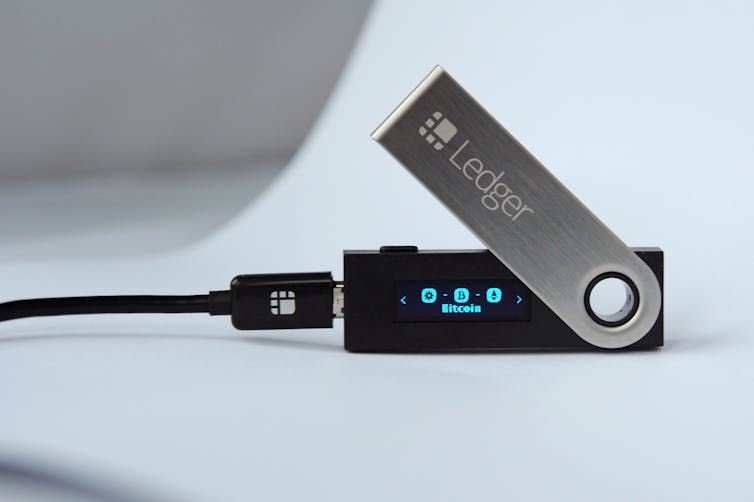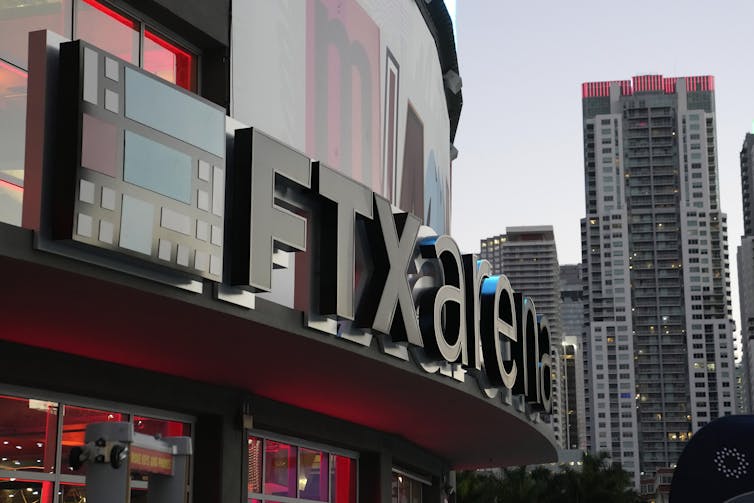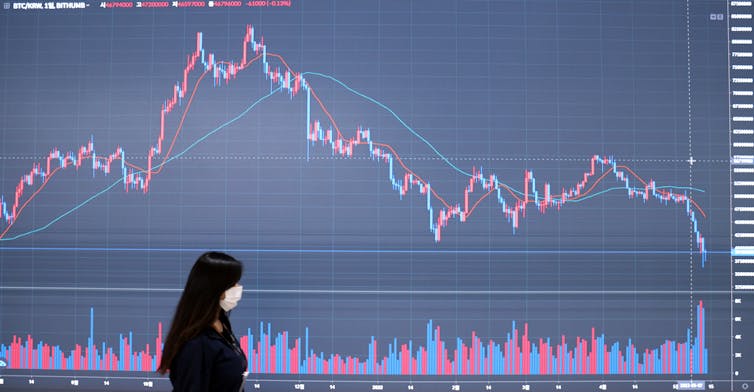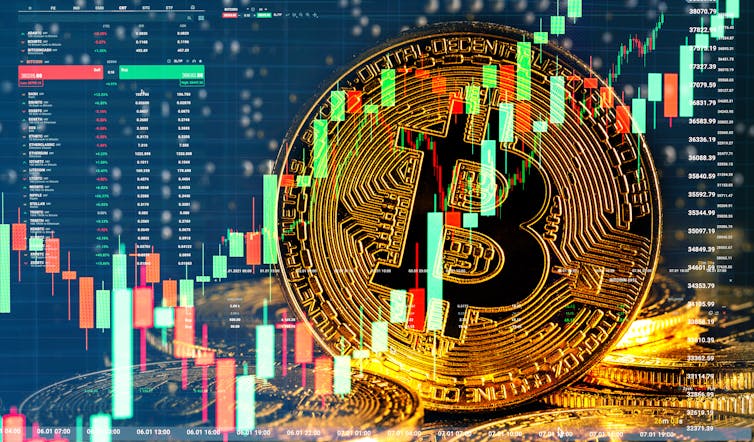Anthony* (a chum) referred to as a couple of weeks in the past, deeply nervous.
A deputy fundamental of a highschool in Queensland, over the last yr he spent loads of hundreds of greenbacks purchasing cryptocurrencies, borrowing cash the usage of his house as fairness.
However now all his property, valued at A$600,000, had been caught in an account he couldn’t get admission to.
He’d purchased thru FTX, the sector’s third-biggest cryptocurrency change, recommended by way of celebrities akin to Seinfeld co-creator Larry David, basketball champions Steph Curry and Shaquille O’Neal, and tennis ace Naomi Osaka.

Wilfredo Lee/AP
With FTX’s impressive give way, he’s now expecting the result of the liquidation procedure this is prone to see him, 30,000 different Australians and greater than 1.2 million shoppers international lose the entirety.
“I assumed those exchanges had been secure,” Anthony mentioned.
He used to be mistaken.
Contents
Now not like inventory exchanges
Cryptocurrency exchanges are infrequently described as being like inventory exchanges. However they’re very other to the likes of the London or New York inventory exchanges, establishments that experience weathered more than one monetary crises.
Inventory exchanges are each extremely regulated and assist keep an eye on percentage buying and selling. Cryptocurrency exchanges, then again, are just about unregulated and serve no regulatory serve as.
They’re simply personal companies that generate profits by way of serving to “ma and pa” buyers to get into crypto buying and selling, taking advantage of the fee charged on every transaction.
Certainly, the crypto exchanges that experience grown to dominate the marketplace – akin to Binance, Coinbase and FTX – arguably undermine the entire imaginative and prescient that drove the advent of Bitcoin and blockchains – as a result of they centralise keep an eye on in a machine intended to decentralise and free up finance from the facility of governments, banks and different intermediaries.
Those centralised exchanges aren’t had to industry cryptocurrency, and are just about the least secure means to shop for and cling crypto property.
Buying and selling ahead of exchanges
Within the early days of Bitcoin (all of the long ago in 2008) the one strategy to gain it used to be to “mine” it – incomes new cash by way of appearing the advanced computations required to make sure and document transactions on a virtual ledger (referred to as a blockchain).
The cash could be saved in a virtual “pockets”, an utility very similar to a non-public checking account, out there best by way of a password or “personal key”.
A pockets will also be digital or bodily, on a small moveable tool identical in look to a USB stick or small telephone. Bodily wallets are the most secure as a result of they may be able to be unplugged from the web when no longer getting used, minimising the danger of being hacked.

Shutterstock
Sooner than exchanges emerged, buying and selling concerned house owners promoting at once to consumers by way of on-line boards, shifting cash from one pockets to every other like all digital finances switch.
Decentralised vs centralised
All this, alternatively, required some technical wisdom.
Cryptocurrency exchanges lowered the will for such wisdom. They made it simple for much less tech-savvy buyers to get into the marketplace, in the similar means internet browsers have made it simple to navigate the Web.
Two forms of exchanges emerged: decentralised (DEX) and centralised (CEX).
Decentralised exchanges are necessarily on-line platforms to glue the orders of consumers and dealers of cryptocurrencies. They’re simply there to facilitate buying and selling. You continue to wish to cling cryptocurrencies for your personal pockets (referred to as “self-custody”).
Centralised exchanges pass a lot additional, getting rid of wallets by way of providing a one-stop-shop provider. They aren’t simply an middleman between consumers and dealers. Quite than self-custody, they act as custodian, protecting cryptocurrency on shoppers’ behalf.
Alternate, dealer, financial institution
Centralised exchanges have confirmed hottest. Seven of the sector’s ten greatest crypto exchanges by way of buying and selling quantity are centralised.
However what shoppers achieve in simplicity they lose in keep an eye on.
You don’t give your cash to a inventory change, for instance. You industry thru a dealer, who makes use of your buying and selling account whilst you purchase and deposits a refund into your account whilst you promote.
A CEX, then again, acts as an change, a brokerage (taking shoppers’ fiat cash and changing it into crypto or vice versa), and as a financial institution (protecting buyer’s crypto property as custodian).
Because of this FTX used to be protecting money and crypto property price US$10-50 billion. It additionally acted like a financial institution by way of borrowing and lending cryptocurrencies – although with out shoppers’ wisdom or settlement, and with none of the regulatory duty imposed on banks.
Retaining each wallets and keys, founder-owner Sam Bankman-Fried “borrowed” his shoppers’ finances to prop up his different companies. Consumers realised too overdue they’d little keep an eye on. When it bumped into bother, FTX merely stopped letting shoppers withdraw their property.
The facility of promoting
Like stockbrokers, crypto exchanges make their cash by way of charging a fee on each and every industry. They’re subsequently motivated to extend buying and selling volumes.
FTX did this maximum thru famous person and sports activities advertising. Because it used to be based in 2019 it has spent an estimated US$375 million on promoting and endorsements, together with purchasing the naming rights to the stadium utilized by the Miami Warmth basketball staff.

Lynne Sladky/AP
Such advertising has helped to create the semblance that FTX and different exchanges had been as secure as mainstream establishments. With out such advertising, it’s arguable the worth of the cryptocurrency marketplace would have risen from US$10 billion in 2014 to US$876 billion in 2022.
Learn extra:
Why sports activities sponsorship is not likely to save lots of cryptocurrency corporations from ‘crypto iciness’
Now not your key, no longer your cash
There’s an adage amongst crypto buyers: “Now not your key, no longer your cash, it’s that easy.”
What this implies is that your crypto isn’t secure except you have got self-custody, storing your individual cash for your personal pockets to which you by myself keep an eye on the non-public key.
The base line: crypto exchanges aren’t like inventory exchanges, and CEXs aren’t secure. If the worst eventuates, whether or not it’s an change give way or cyber assault, you possibility dropping the entirety.
All investments elevate dangers, and the unregulated crypto marketplace carries extra possibility than maximum. So observe 3 golden regulations.
First, do a little homework. Perceive the method of buying and selling crypto. Learn to use a self-custody pockets. Till governments keep an eye on crypto markets, particularly exchanges, you’re in large part by yourself.
2nd, if you happen to’re going to make use of an change, a DEX is extra protected. There’s no proof thus far that any DEX has been hacked.
Finally, on this global of volatility, best possibility what you’ll have enough money to lose.
Learn extra:
Crypto: what may just extra law imply for the way forward for virtual currencies?
*Identify has been modified.
Supply Through https://theconversation.com/i-thought-crypto-exchanges-were-safe-the-lesson-in-ftxs-collapse-195800


